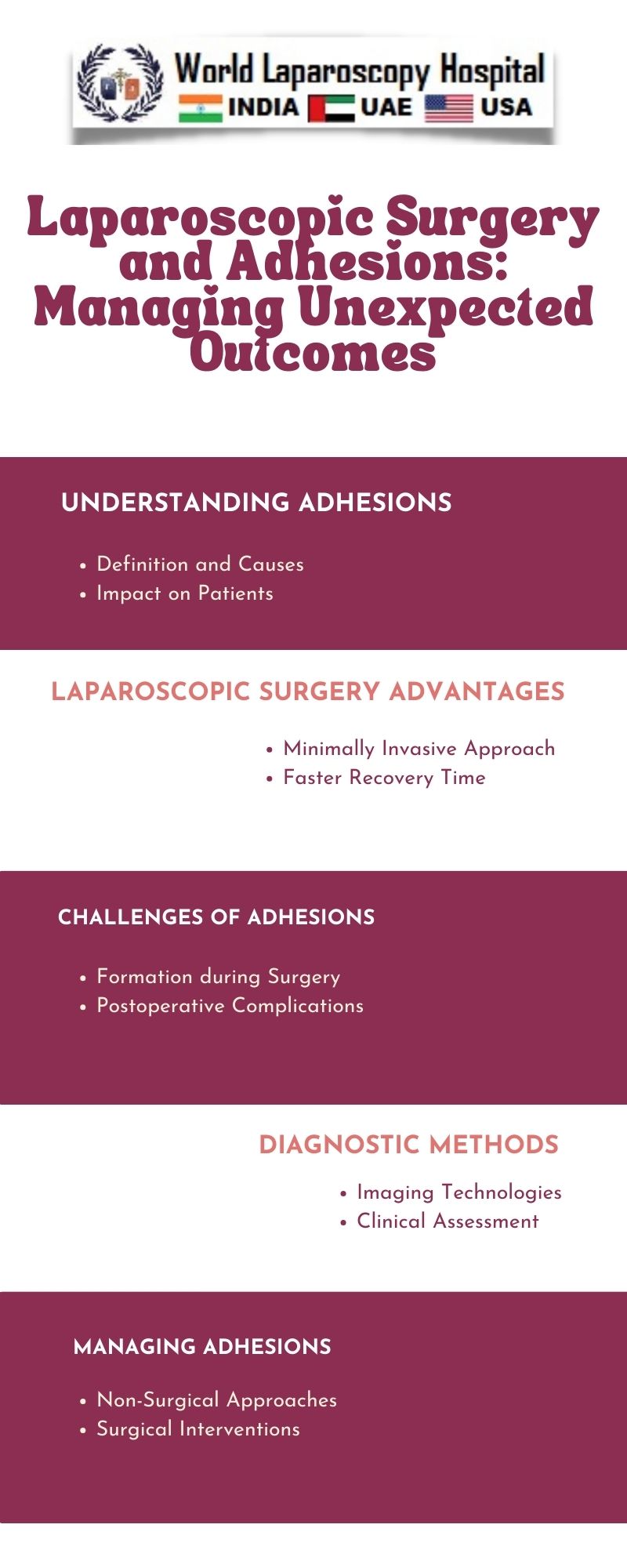Laparoscopic Surgery and Adhesions: Managing Unexpected Outcomes
Introduction:
Laparoscopic surgery, also known as minimally invasive surgery, has revolutionized the field of medicine by offering patients faster recovery times, reduced pain, and smaller incisions. However, like any medical procedure, laparoscopic surgery is not without its challenges. One such challenge that surgeons may encounter is the development of adhesions – a phenomenon that demands careful consideration and skillful management.

Understanding Laparoscopic Surgery:
Definition and Evolution:
Laparoscopic surgery involves the use of a thin, lighted tube with a camera (laparoscope) and specialized instruments to perform surgery through small incisions. This innovative approach has significantly transformed traditional surgical methods, providing numerous benefits for both patients and healthcare professionals.
Advantages of Laparoscopic Surgery:
Minimized scarring:
Smaller incisions result in less visible scarring, contributing to improved cosmetic outcomes.
Reduced pain and discomfort:
The minimally invasive nature of laparoscopic surgery often leads to less postoperative pain, enhancing patient comfort.
Quicker recovery:
Shorter hospital stays and faster recovery times are characteristic of laparoscopic procedures, allowing patients to resume their daily activities sooner.
The Complex World of Adhesions:
What Are Adhesions?
Adhesions are bands of scar tissue that form between organs and tissues, often as a natural part of the healing process following surgery or injury. In the context of laparoscopic surgery, adhesions can pose unexpected challenges for both surgeons and patients.
Causes of Adhesions:
Surgical trauma:
Tissue manipulation during surgery can trigger the body's natural healing response, leading to the formation of adhesions.
Infection:
Postoperative infections may exacerbate the development of adhesions, complicating the healing process.
Inflammation:
Chronic inflammation, whether due to an underlying condition or as a response to surgery, can contribute to adhesion formation.
Impact on Laparoscopic Surgery:
Altered anatomy:
Adhesions can distort normal anatomy, making it difficult for surgeons to identify and access targeted areas.
Increased operative time:
Surgeons may encounter challenges navigating through adhesive bands, leading to extended operative times.
Potential complications:
dhesions can increase the risk of complications such as organ injury, bleeding, and postoperative pain.
Strategies for Managing Adhesions in Laparoscopic Surgery:
Preoperative Evaluation:
Patient history:
Thoroughly reviewing a patient's medical history, particularly previous surgeries and any history of abdominal infections, is crucial in assessing the risk of adhesion formation.
Imaging studies:
Utilizing advanced imaging techniques, such as computed tomography (CT) scans or magnetic resonance imaging (MRI), can aid in identifying existing adhesions and planning the surgical approach accordingly.
Adhesion Prevention Techniques:
Barrier agents:
The use of anti-adhesive barriers, such as films or gels, during surgery can help minimize direct contact between tissues, reducing the risk of adhesion formation.
Gentle tissue handling:
Delicate and meticulous tissue manipulation during surgery can help minimize trauma, decreasing the likelihood of adhesion development.
Intraoperative Strategies:
Adhesiolysis:
Surgical techniques involving the careful dissection and removal of adhesions are often employed to restore normal anatomical relationships.
Adhesion barriers:
Applying barrier agents directly to affected areas during surgery can prevent new adhesions from forming.
Postoperative Considerations:
Monitoring for Complications:
Early detection:
Close postoperative monitoring is essential to promptly identify and address any complications related to adhesions.
Symptom management:
Addressing postoperative pain and discomfort through appropriate pain management strategies is crucial for patient recovery.
Rehabilitation and Follow-up:
Physical therapy:
For patients experiencing functional limitations due to adhesions, rehabilitation programs may be beneficial in restoring mobility and function.
Regular follow-up:
Scheduled follow-up appointments allow surgeons to assess the healing process, address any concerns, and monitor for potential complications.
Conclusion:
Laparoscopic surgery has undoubtedly revolutionized the world of surgery, offering patients a less invasive and more efficient approach to various medical procedures. However, the presence of adhesions adds a layer of complexity that requires careful consideration and strategic management. Surgeons must be equipped with a thorough understanding of adhesion formation, coupled with proactive strategies for prevention and effective intraoperative techniques to navigate this intricate landscape successfully. By addressing adhesions with a comprehensive approach, the medical community can continue to enhance the safety and efficacy of laparoscopic surgery, ultimately improving patient outcomes and shaping the future of surgical innovation.
| Older Post | Home | Newer Post |





